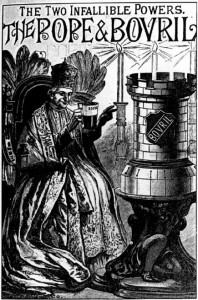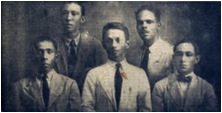 In 1870, Napoleon III was waging war on the Prussians, and he needed one million tins of beef to feed his troops. A Scotsman named Johnson landed the gig and concocted Bovril, a concentrated beef paste that can be spread on crackers, eaten with a spoon, whathaveyou. Its most popular incarnation became, and remains, mixed into hot water. Napoleon died and Prussia disappeared, but instant beef soup marched on. Apparently, generations of soccer fans and sufferers of the common cold have soldiered through their bludgeoning English winters on the strength of Bovril. Pope Leo XIII even stumped for it with the ad slogan: The Two Infallible Powers – The Pope & Bovril.
In 1870, Napoleon III was waging war on the Prussians, and he needed one million tins of beef to feed his troops. A Scotsman named Johnson landed the gig and concocted Bovril, a concentrated beef paste that can be spread on crackers, eaten with a spoon, whathaveyou. Its most popular incarnation became, and remains, mixed into hot water. Napoleon died and Prussia disappeared, but instant beef soup marched on. Apparently, generations of soccer fans and sufferers of the common cold have soldiered through their bludgeoning English winters on the strength of Bovril. Pope Leo XIII even stumped for it with the ad slogan: The Two Infallible Powers – The Pope & Bovril.
Around that time, one of the Pope’s most wayward of children—an Irish socialist named James Connolly who started working at 11 and studying Marx soon thereafter—was helping to set off the 1916 Easter Uprising against English occupation. The story goes (at least according to the book in What the Great Ate; perfunctory searching on my part turns up no other records) that Connolly was shot in the ankle while taking over Dublin’s General Post Office and requested a cup of tea to re-cooperate. When no tea could be found, Connolly was offered a cup of Bovril. He damned the soup for being made by scab labor. Soon thereafter, he was captured by the English army, lashed to a chair, shot, and dumped in an unmarked mass grave. John Lennon told Dick Cavett that he was the inspiration for ‘Woman is the Nigger of the World.’
Though further perfunctory google searches turned up nothing about Bovril’s labor practices, I thought a few peeks into the intersections of food and labor politics might be fun.
- What with the whole slavery of Africans and annihilation of American Indians, I think we sometimes forget that indentured servitude of, ah-hem, Poor White Trash was also a cornerstone of early American economies. The standard ration for indentured servants in my home state of Virginia in 1661 included meat three times a week. A jackass plantationer named Major Goodwin (great-great-grandfather-cubed of Heller’s Major Major?) cut his people’s diets to cornbread and water, and folks got upset. Two servants, Isaac Friend and William Cluton, petitioned the English king and led marches through town with irate half-slaves yelling that they’d “be free or dye for it.” Ultimately, the county court shook their fingers at Goodwin and other landowners for not keeping better control of their servants. Cluton was charged with inciting rebellion but released after people testified to his upstanding character. The next year, the court passed a law prohibiting servants from unlawful meetings.
- In 1676, in the same state, Nathanial Bacon led an uprising of 1000 laborers, including white indentured servants and poor blacks, against the governor. They felt the governor was too kind toward the American Indians, and began attacking Indians themselves and eventually driving the governor from Virginia and torching the capital. It was the first American uprising by free whites. The cooperation between whites and blacks caused plantation owners to take a more proactive stance in using the Bible and other tools to convince poor whites that they were at least better than low-down dirty darkies, tweaking the caste system toward directions we still enjoy to this day.
The dude’s name was Bacon.
- In 1741, the bakers of New York City banded together and went on strike. That’s all I got.
- The United Fruit Company owned vast banana plantations in Colombia in 1928. It also packed serious weight in U.S. politics. When the workers of the plantations demanded written contracts, eight-hour work days, and six-day work weeks, United Fruit ignored them. After a month long strike, they were not so laissez-faire. They went to the American Congress and the White House, and the States told the Colombian government they would send in the Marine’s if things weren’t sorted out lickety-split. They stationed boats off the Colombian coast. When a crowd of
workers and their wives and children gathered in the Santa Marta town square after Sunday mass to await a public address from the governor, General Cortés Vargas blocked off all of the roads leading from the square, erected machine guns on the roofs of the buildings surrounding it, issued a five-minute warning, and then opened fire. Government accounting noted 47 dead. Historians have tallied as high as 2,000. Vargas defended himself before the Colombian Senate, stating that he fired on his people to stave of the American invasion. The Senate seemed to feel he should have saved those bullets on the invaders. United Fruit, for its part, morphed through some different identities until becoming Chiquita Brands International in 1984.

